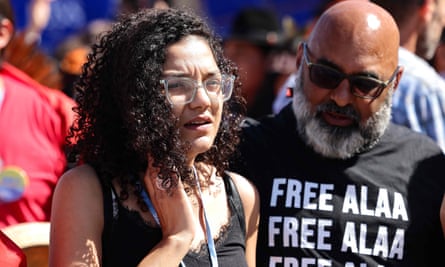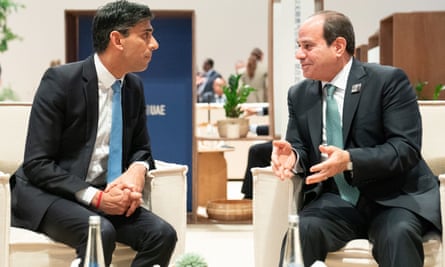The relatives of Alaa Abd el-Fattah, a British-Egyptian writer and activist who is currently in prison, have expressed disappointment in the British government’s inaction in securing his release. Despite assurances from Prime Minister Rishi Sunak to his sister that the government was fully dedicated to resolving the situation, it has been a year without progress.
Abd el-Fattah, a prominent leader during Egypt’s 2011 revolution that resulted in the removal of President Hosni Mubarak, has spent the majority of the last ten years in prison for his involvement in activism. Despite a short period of release under police supervision, he was arrested again in 2019 and recently received an additional five-year sentence for sharing a social media post about torture that was deemed to spread false information and threaten national security.
In December 2021, while in Egypt’s prison, he acquired British citizenship through his mother, Laila Soueif, who is a well-known activist for human rights.
Sanaa Seif, Alaa’s sister, expressed that they believed obtaining British citizenship could potentially lead to his freedom. However, it now seems that it only brought false hope and possibly exacerbated the situation.
Last year in November, during the Cop27 climate conference in Egypt, Abd el-Fattah, a 42-year-old writer and activist, was on the brink of death. He had been on a six-month partial hunger strike to protest his detention conditions, specifically for a consular visit from British officials. As the conference approached, he escalated his strike by refusing all food and then also refusing water, leading to his collapse.
On November 5th of last year, Sunak sent a message to Seif stating that the government is fully dedicated to finding a solution for Alaa’s case as quickly as possible. He also mentioned that the case is still a top priority for the British government.

He stated that government officials are continuing to push for immediate consular access to Alaa and also calling for his release at the top levels of the Egyptian government.
Other areas of the British government were also worried about Abd el-Fattah’s situation. The Ministry of Defence shared with the Guardian that although ex-defence minister Ben Wallace did not bring up the issue, Admiral Sir Tony Radakin, the chief of defence staff, talked about it with Egyptian counterpart Lieutenant General Osama Askar on November 6th, 2022, after receiving a freedom of information request.
The day after, Sunak had a public meeting with Abdel Fatah al-Sisi, the president of Egypt, at Cop27 in Sharm el-Sheikh. They were photographed shaking hands, providing reassurance to al-Sisi despite growing backlash over his treatment of Abd el-Fattah and many others who have been imprisoned in Egypt.
In mid-November of last year, Abd el-Fattah ended his strike after being kept incommunicado during Cop27. He also received medical care, but unfortunately, there was no advancement in his efforts to secure a consular visit.
Since Sunak and Sisi’s initial public encounter a year ago, the family of the detained activist has lost hope as the British government has not shown the same dedication to his situation as promised by the prime minister in his letter, while Egypt continues to block diplomatic access.
There is limited proof that the British Foreign Office (FCDO), No 10, or any other government entity in Britain has taken significant action to communicate with the Egyptian government in order to secure the release of Abd el-Fattah.
Seif remarked that there has been no progress at all. He found it odd that Egyptian officials are still delaying and the British government is tolerating it.

On December 1, 2023, Sunak and Sisi had a second meeting at Cop28. During the meeting, Sunak asked about the progress in the case of Alaa Abd el-Fattah and reaffirmed the UK’s request for his release. This information was reported in a summary of the meeting.
The FCDO has consistently refused to provide the requested information to Abd el-Fattah’s family or respond to FoI requests from the Guardian. This includes basic inquiries such as the frequency of diplomatic visits to Abd el-Fattah in prison since his citizenship was granted in 2021.
In February, Tariq Ahmad, the Middle East minister, had a meeting with Soueif. The meeting was also briefly attended by former foreign minister, James Cleverly. They both promised to share more information about their actions on Abd el-Fattah’s case and address the issue of whether British diplomats attempted to fulfill his request for a consular visit.
In late November, MP David Rutley stated in a parliamentary session that Egyptian foreign minister Sameh Shoukry had been approached by several ministers, including Ahmad and Cleverly, to discuss the case.
Despite quickly acknowledging Seif’s British citizenship, which she obtained while in prison on charges of “spreading false news” in 2021, the Egyptian government has consistently refused to recognize Abd el-Fattah’s citizenship. Amnesty International has denounced the conviction as “bogus charges” and a “miscarriage of justice.”
Permitting British diplomats to visit Abd el-Fattah at the desert prison where he is currently incarcerated would serve as a significant indication of Egypt’s acknowledgement of his British citizenship. This action could potentially advance the progress of the case. Formal appeals for a consular visit would also demonstrate that Britain is unwilling to allow Egypt to continue delaying the case.
However, the FCDO has consistently refused to disclose whether any efforts have been made to visit him while he is in custody. The Guardian initially asked for this information through Freedom of Information in January 2023.
In the time that has passed, the FCDO has acknowledged that it possesses the information that was requested. However, they have continuously delayed and given various explanations for not revealing it. These reasons include the volume of data requested, concerns about privacy, and the importance of safeguarding the UK’s interests and promoting international relationships. They also believe that trust and confidence between governments is crucial for successful international relations.
The Guardian requested information on how often Cleverly has brought up Abd el-Fattah’s case since becoming a British citizen, but the FCDO refused to answer. The ministry also declined to disclose the number of times the prime minister has raised the case with Sisi.
Seif stated that the previous foreign secretary showed no concern. He believes that if Lord David Cameron made it a priority, it would be accomplished, in regards to the new person taking on the role.
The Department for Business and Trade replied to a different Freedom of Information request, stating that the trade envoy to Egypt, Sir Jeffrey Donaldson, has had meetings with Egyptian officials since Abd el-Fattah became a British citizen. However, they refused to disclose if the case was brought up during these meetings, citing concerns that it may harm the relationship between the UK and another country.
Seif expressed frustration over his loved one’s prolonged detention, stating that it has been two years since they have been able to visit him. According to Seif, Egyptian officials claim that proper paperwork has not been completed, insinuating that they have been negligent in this matter. Seif questions why British officials have not taken further action and wonders if there is a lack of motivation to do so. He also raises concerns about the potential impact on the safety of other British citizens who may be detained abroad.
A representative from FCDO refused to respond to inquiries regarding the disclosure of information or if they had made a request to visit Abd el-Fattah in prison.
The spokesperson stated that our goal is for Alaa Abd el-Fattah to be freed and we are urging the Egyptian government to take action on this matter. The prime minister discussed Mr. Alaa Abd El-Fattah’s situation with President Sisi just two weeks ago.
Source: theguardian.com


